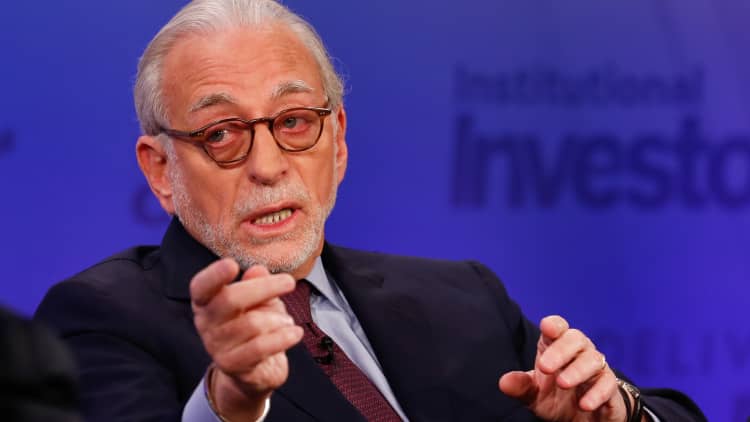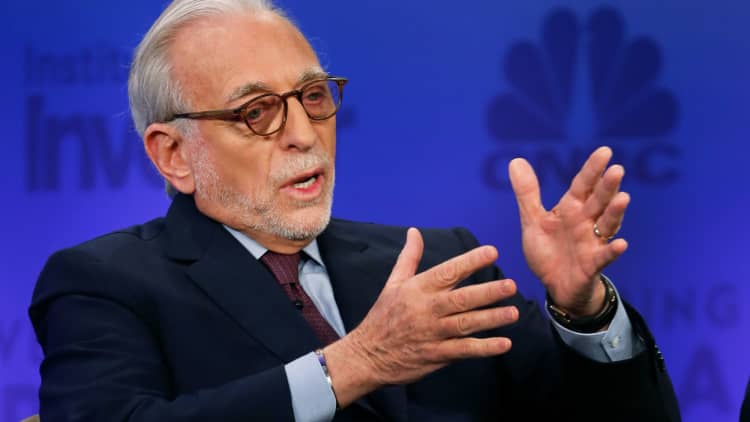
In the increasingly contentious proxy fight between Nelson Peltz and Procter & Gamble, one question gets asked consistently: Why not just add one shareholder to the board?
The answer, according to P&G CEO David Taylor, is simple. "We did our homework" on Peltz, he said, and the "positive recommendations were not forthcoming."
On Tuesday, the consumer product giant unveiled this homework in the form of a report with a section aimed squarely at Peltz himself.
In it, P&G seeks to show that when Peltz is invested in a company or sits on its board, he destroys rather than adds long-term value. P&G also points to examples where Peltz says one thing during his proxy campaigns and then does another once he's on the board.
This is an unprecedented defense tactic by any company targeted by an activist investor but one that could become more common as shareholder dissidents target bigger and bigger companies — which have the firepower and the funds to fight back.
Peltz's Trian Partners takes stakes in companies and then pushes them to overhaul boards and operations to generate more profit for shareholders. Past campaigns have been directed at DuPont and Heinz.

P&G analyzed all of Trian's investments greater than $25 million that the firm has held for more than two years and has already sold. According to the report, Trian's investments tended to lag the S&P 500 by about 5 percent during the year before Trian announced it had taken a stake. Annualized returns measured from one week after the announcement through the date Trian finally sold its positions outperformed the S&P 500 by about 0.3 percent. And the shares underperformed the market by 2.5 percent one year after Trian exited.
In an interview Tuesday morning on CNBC, Peltz pushed back. He said for the companies where he has gotten a board seat, total shareholder return and earnings both outperformed the S&P by 8 percent. He said his track record "speaks for itself."
Trian announced a $3.5 billion P&G stake in February, and at first, the relationship seemed cordial. Then, in July, Trian nominated Peltz to P&G's board of directors and showcased what he was not recommending (breakup, CEO and director replacement, excessive leverage, pension-benefit cuts, R&D reduction).
Earlier this month, Peltz published a 94-page white paper that gave more details of his plan, including a reorganization into three business groups under a holding company and a focus on smaller, local brands.
"They are overseeing a melting ice cube," Peltz said Tuesday on CNBC.
P&G's response so far has been to repeat that it had what it described as the "right plan, right structure and right board in place to continue its successful transformation."
Tuesday's report takes their defense strategy one step further before shareholders vote at the company's annual meeting on Oct. 10.
As part of the research, P&G looked at three different consumer-oriented companies in which Trian held stakes before: Mondelez, Heinz and Wendy's.
With Mondelez, the report said, once Peltz got a seat on the board, the company raised prices and sales volumes declined. P&G pointed out that Mondelez's margins did expand during that period but so too did those of its peer group.
Peltz said on CNBC that cocoa prices went up, and the only logical reaction was to raise prices for chocolate. He said Mondelez' management has done a "magnificent job" improving margins.
At Heinz, where prices also increased and sales volume decreased after Trian joined the board, the P&G report said. However, according to P&G, Heinz's margins stayed flat during his tenure and earnings-per-share-growth was attributed largely to a lower effective tax rate.
That came after Peltz said he would increase gross margins by 2 percentage points, reduce overhead costs as a percentage of sales, and generate $575 million in savings. Additionally, Peltz said he would shed Infant Nutrition and ABC, but Heinz still owns those businesses today. Peltz did urge Heinz to repurchase shares, which was done.
Regarding Wendy's, the report focused on Peltz's 2005 campaign to streamline the business around the restaurant's brand, while doing a 100 percent tax-free spinoff of Tim Hortons and selling its other brands, like Baja Fresh, Cafe Express and Pasta Pomodoro. The company subsequently sold all of those brands.
Then, in 2008, Peltz orchestrated a merger between Wendy's and Arby's parent company, Triarc. Three years later, Arby's was sold for $1 billion less, according to the report.
To Peltz's credit, the widely followed activist who has amassed nearly $13 billion in his hedge fund, has found support already from at least one prominent shareholder. Yacktman Asset Management disclosed a letter backing Peltz 's nomination, saying that P&G shareholders ''deserve a highly engaged, shareholder-focused voice in the boardroom.'' Yacktman said it holds about 15 million shares of P&G.
P&G is working with Goldman Sachs, Morgan Stanley, Centerview and Lazard to defend against Trian, a person familiar with the matter said. The company disclosed it is spending $35 million on this defense, but Peltz has said the figure could be as high as $150 million.


